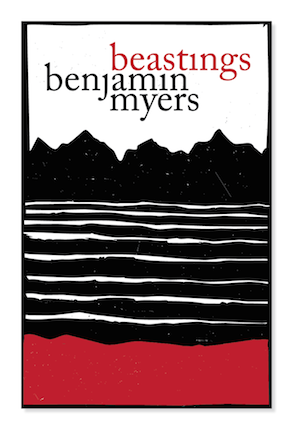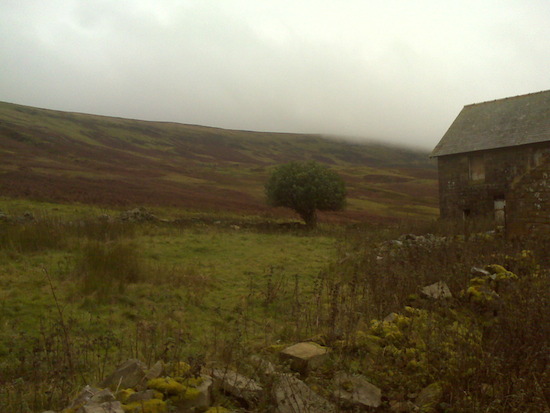I wrote the bulk of my new novel Beastings whilst living in a rented weaver’s cottage in the Pennines, built in 1641, which was covered in a beautiful Virginia Creeper that turned fire-red in the winter and was freezing cold even in the height of summer. Our water came from a spring up the hill and only after I had moved out did a neighbour ask if the ghost of the little dead girl that occupied our bedroom had ever bothered me as she had several previous tenants. She hadn’t because I don’t believe in ghosts.
But nevertheless the sense of history and place effected the writing greatly. Though set in remote Cumbria rather than Yorkshire, the moiling sky and scudding clouds, the daily curtain of rain blowing off the moor, the missing stones in the walls where the weavers had set their candle stubs and hidden their money all fed into the rural noir / gothic undertones of the book. I never planned to write a story set in the distant past – and which features a mute girl who abducts a baby and a sadistic priest with a penchant for sex and medicinal cocaine – but that’s just how it works out sometimes.
I don’t listen to music when writing fiction, though I do tend to compile a playlist or soundtrack for each new novel that I write. This usually emerges over the first few weeks. Here then are some of the influences on Beastings.
Earth – ‘The Driver’
All I originally knew of Dylan Carlson were the Kurt Cobain associations and his appearance in that Nick Broomfield documentary, but then I interviewed him during the writing of Beastings (my day job is journalism) and it turned out he is a massive expert on English folk music and mythology. He was the only other person that I knew of who was a fan of Mr Fox (see below) and I feel he understands indigenous British music more than most. He’s known as the Godfather of drone music, but that tag does his music a disservice. I see his work as comparable to that of David Lynch, Mark Rothko or Cormac McCarthy. Each Earth song is a film or a novel in size and scope.
Wild Beasts – ‘All The King’s Men’
‘Indie rock’ as a concept seems so dull and unimaginative in 2014 but to me, Wild Beasts are pure feeling, a heartfelt product of their environments – that odd clash between the wild landscape of Cumbria and a more knowing and urban outlook on life by young men gliding through the 21st century. I’ve always found that simian swagger that is so closely associated with music from ‘The North’ utterly ridiculous, but Wild Beasts represents the best aspects of the uplands: they are poetic, romantic, lascivious, faux-brutish, intellectual, outward-looking. Their second album Two Dancers was a primary source in the writing of this book and ‘All The King’s Men’ with its references to girls as “birthing machines”, is a shimmering, tempered thing of restrained beauty.
Vvlad – ‘In The Pines’
A couple of years back I was introduced to a whole sub-genre of black metal bands who are inspired by the earliest blues, and use guitars made out of cigar boxes. That strange and incongruous collision between nihilistic, Northern European fury and the traditional slave songs of America is what makes music such an ever-evolving entity. My last couple of novels have obliquely considered the after-effects of industrialisation, disconnection from surroundings and the steady shift from agrarian/rural culture to urbanisation, and I feel that the best black metal conveys those feelings of modern man’s displacement in a way that’s beyond language (though obviously the sight of grown men in corpse-paint neuters the impact somewhat). I don’t know who Vvlad is, but this version of the Leadbelly song sounds like a beastial moan, a storm, a violent assault, starvation, a burning barn of animals – all of which are recurring images in Beastings.
90 Day Men – ‘Saint Theresa in Ecstasy’
As I get older I find that volume and bluster and melody is not enough. I love the economical simplicity of American hardcore but man cannot live on 90 second-long songs alone. So I always seek music that hits on a different level and I think 90 Day Men, who came out of the turn of the millennium post-rock/post-hardcore scene, fulfil that need with their 2002 album To Everybody. They’re one of the lost great American underground bands of recent years – so much more interesting than Radiohead and in possession of better songs than Slint.
Arthur Askey – ‘The Bee Song’
Any song can sound sinister in the wrong context.
Mr Fox – ‘Mr Fox’
Mr Fox were a short-lived duo who created some of the most under-rated folk music during that fertile period of the early 1970s when the idyllic 60s dream took a darker turn. They were the band who made me realise that folk can be as heavy, dark and intense as any music out there – and also that everywhere you turn in England there is a great story buried just beneath the topsoil. Their songs are stories and ‘Mr Fox’ is utterly chilling – a combination of Third Ear Band/Velvet Underground-style drones and Fairport Convention-inspired English folk, with Carolanne Pegg’s vocals cutting right through the middle. It’s a violent and blood-soaked piece of musical mythology. I was talking to a friend of mine one day and she mentioned that her Dad had once been in a folk band. When I asked what they were called she said “You won’t have heard of them – they were called Mr Fox.” Life is full of such serendipitous moments.
Brainiac – ‘Fresh New Eyes’
This malevolent digital throb is the soundtrack to a scene in which one of the character in Beastings loses an eye. Brainiac were one of the best bands I ever saw live, their career cut short by the tragic death of their singer Timmy Taylor.
British Sea Power – ‘Carrion’
Another Cumbrian band so in touch with their surroundings that they bring it on stage with them. I enjoy everything that British Sea Power have done and I’ve seen them live many times. They make me want to whittle spears and jump in lakes, and I like to think that the spirit of their music is indirectly reflected in Beastings. The lyrics to ‘Carrion’ are fantastic too: “Can stone and steel and horse’s heels / Ever explain the way you feel?” I once had a very powerful experience on magic mushrooms listening to their first album. The roof lifted off my tiny flat in Peckham, golden sunlight beamed down and I removed my clothes and saw my entire body sprout coarse animalistic fur. For a few hours I was a feral woodland creature. I have now been straight edge for ten years.
Demdike Stare – ‘Ghostly Hardware’
The mistake that so many musicians make is believing that “authentic” means “old”. Old instruments old themes, old sartorial styles. That’s why there is so much terrible music being made by risible urbanites with mandolins who are dressed like share-croppers. It’s beyond the pale. Demdike Stare make modern music for modern times, just as Cabaret Voltaire, This Heat and Throbbing Gristle did before them. They are inspired by where they are from and what they experience. Therefore they are folk music. If Beastings were ever to be filmed I would love to employ the services of Demdike Stare – or Teeth Of The Sea or 65DaysOfStatic – to soundtrack this story that is set in the late 19th century. Mumfords meanwhile would be hunted across the fells and then strung up by their own steaming viscera; it wouldn’t take long – their footwear is totally inappropriate for outdoor use.
Dave Goulder & Liz Dyer (with the Broken Consort) – ‘The Sexton and the Carpenter’
I spent a lot of last winter in a cottage in the Scottish borders, listening to this song over and over. I first heard it on Ben Rivers’ breathtaking film Two Years At Sea, about a recluse living up in the woods of Aberdeenshire. Like Mr Fox, it’s a really violent tale of sexual skulduggery and betrayal in backwoods England. The only place you can hear it online is <a href=” http://folkcatalogue.wordpress.com/2009/06/19/1971-dave-goulder-liz-dyer-the-raven-and-the-crow/“ target=”new”>here.
Uncle Acid & The Deadbeats – ‘I’ll Cut You Down’
There is still something elemental about rock music that appeals to man’s base desires – and I still believe that a good guitar riff played over and over and amplified via the medium of electricity can have a mental and physical effect. You only have to witness the crowd’s reactions at gigs to see that that pagan impulse to lose ones inhibitions and enter a hypnotic state is still within us as humans. Uncle Acid & The Deadbeats sound like The Beatles had they got into smack, sacrifice and knife-play instead of peace and love.
Can – ‘Safe’
Almost all my favourite albums are Best Of’s or compilations that you can buy in service stations – and a CD I have that has Can’s two late 70s albums Out Of Reach / Inner Space on it. Fans and critics agree that it is their worst release because some of the band had left to be replaced by members of Traffic, and because they did a upbeat synthesizer version of the ‘The Can-Can’ on it, but to me these are plus points. Because there is a lot of repetition and the vocals/lyrics are often the least significant component of their music, Can are one of the very few bands I can listen to while writing. Also all their albums are concerned with occupying new auditory landscape / headspace, which something that I think good writing can do too.
Mogwai – ‘My Father, My King’
Around the time that Mogwai released their Black Sabbath cover I went, as a then-journalist for Melody Maker, with Stuart and Dominic from Mogwai to Ozzfest to interview Ozzy Osbourne. We were all 22 and excited. We arrived at midday, but the meeting didn’t happen until midnight, by which time they had bought and sniffed a big bottle of amyl nitrate. They had recently changed their names to Plasmatron and Demonic and were going through their Kappa track-suit phase. When the meeting finally happened, in the mud after dark, Ozzy went to shake their hands but fell over and Dominic just managed to catch him by grabbing the back of his trousers. Who would have thought that these two giggling young men would be responsible for one of the best bands Britain has ever produced? Described as "two parts serenity and one part death metal", their interpretation of this traditional Jewish prayer hymn ‘My Father, My King’ is one of the great recorded pieces of music of the early 21st century.

Beastings is published July 3rd 2014 by Bluemoose Books and is available to buy here. Ben Myers can be found here: www.benmyers.com



